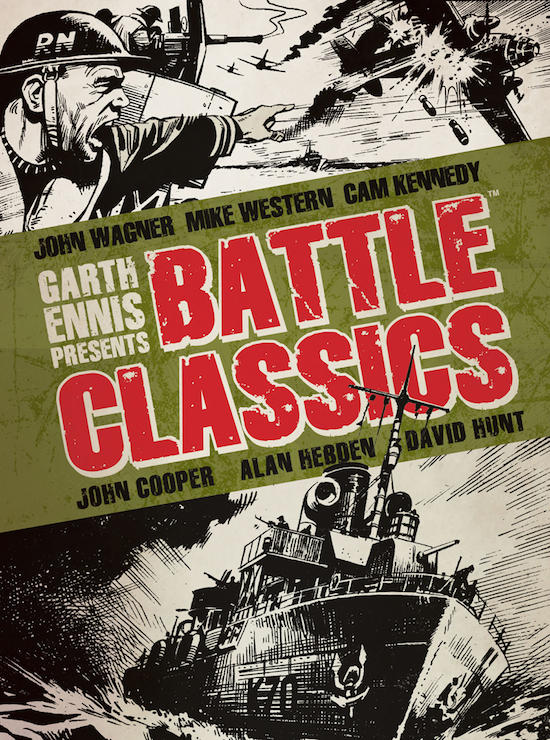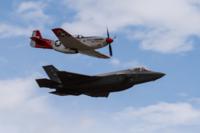
Battle Picture Weekly (published from 1975 to 1988) was a giant influence on an entire generation of UK comic artists. The magazine's war stories aimed for a more true-to-life feel than what Americans saw in comic books like Sgt. Rock.
Titan Books has enlisted contemporary comics author Garth Ennis to put together Garth Ennis Presents Battle Classics, a collection that features several of Ennis' favorite stories, including "HMS Nightshade"and the never-before-reprinted "The General Dies At Dawn."

Ennis is best known for his work on Hitman, the Vertigo comics series Preacher and the nine years he spent writing Marvel's Punisher. We talked to him about his work on the new collection.
How were you introduced to Battle comics?
Battle was published weekly from 1975 to 1987. I began reading it in 1978 and stuck around for another 5-6 years, pretty much the comic's glory days, In war comics terms Battle was something of a quantum leap, largely thanks to the influence of its creators Pat Mills and John Wagner, who are more or less our Lee and Kirby. It was more immediate and exciting than other British war comics around at the time- titles like Warlord and Victor had some nice art and good characters, but lacked Mills and Wagner's ability to kick things up a gear. Along with their other creations, Action and 2000AD, Battle provided something more intense than anything else that was around at the time. As an eight year-old I went for it like it was the gold at the end of the rainbow.
Younger American audiences didn’t really grow up with the kind of war comics you did in Britain during the ‘60s & ‘70s. What was their cultural impact in the UK? How did they influence you and other writers and illustrators in your generation?
As I said, Battle was something of a departure from what had gone before. It was more cynical, more violent, with a harshness and an immediacy that even a kid could pick up on- that was, in fact, aimed directly at kids. Once it was established the writers grew in confidence, and they began to tackle themes that comics had stayed clear of up until then- in stories like Darkie's Mob, HMS Nightshade, Johnny Red and in particular Charley's War, which I regard as the finest comic strip ever published. Where material like this took British comics was a place where people who might not have bothered with them suddenly noticed- Alan Moore, who came from an underground comics background, was taking a look at the mainstream around this time, and he eventually decided there might just be a place for him there. The rest is history.
Longer term, Battle's style of storytelling influenced an entire generation of writers and artists. The sci-fi title 2000AD has stood the test of time and gained greater notoriety, but I would personally say that Battle's influence on my own work is at the very least equal to that title's. Ultimately, the best war comics present stories that are based on reality- once you clear away the necessary hyperbolae and melodrama, you're left with material reflecting what men and women actually did in real life. That, for me especially, renders military fiction much more worthwhile than anything in science fiction or fantasy- something I think you can see reflected in much of my work.
In the USA, we had the Comics Code, which defanged all the military/horror/crime titles, and we also had the influence of Vietnam War on U.S. audiences. Did any of that resonate in the UK?
We never had the Comics Code or anything similar, it was really more a matter of editorial discretion- and given that Mills and Wagner's brief was to push the envelope, they were doing their best to be as indiscreet as was realistically possible. Occasionally you would have some media witch hunt or other stirred up by censorship advocates- the most famous instance of this saw the eventual destruction of Battle's sister title, Action, and the fallout from that particular debacle cast a bit of a shadow over Battle and 2000AD for a while ("Tread lightly, you saw what happened to Action," etc). But in terms of an actual set of rules- no.
Certainly, the American war comics I eventually encountered were a major departure from what I was used to- Sergeant Rock and so on have always read like superhero stories in uniform to me, lacking the cynicism and black humour of Battle, and it's possible that this reflects the code's influence in creating a rather watered-down product (I've written some of these characters myself, but only by heavily adapting the original concepts and shoehorning them into straight war stories). Things like Blazing Combat are much more my cup of tea.
How big an influence was 'Battle' on your own 'Battlefields' series?
Huge. Aspects I've talked about like intense storytelling, cynicism of narrative and characters, and bleak, black humour have all found their way into my work. Something else I learned from Battle was the importance of good research, which informed the very best of the comic's stories. But even more directly, some of the concepts I first read about in Battle absolutely fascinated me, even more so when I found out they were based in reality, and I've done my best to present my own take on them in several of of my Battlefields and War Story episodes. So I read about the British Camship concept and Russian women aviators in Johnny Red, and eventually wrote about them myself- in Archangel and The Night Witches, respectively. HMS Nightshade taught me about the horrific Arctic convoy run to Murmansk, which led directly to Nightingale- one of my first and best.
Comics in the USA were always monthly (mostly because of distribution issues in a large country). How did getting these stories in weekly bits influence the experience of reading them for you?
It's hard to say if it had any discernible effect, because without any real experience of US monthlies until I was sixteen or so, I had no idea there was any other way to read comics than by installments in a weekly anthology. UK distribution of American comics was spotty in the 70s and early 80s, nowhere more so than where I grew up in Northern Ireland. Occasionally I'd see one of these things show up, but they always featured superheroes- which, being so far removed from what I was used to in Battle and 2000AD, never failed to put me off. Some of the Marvel stuff was reprinted as a black & white weekly, but again, I don't remember seeing it that often.
I suppose you could say that a weekly schedule cranks up the intensity of the story, but ultimately it doesn't matter if you're waiting a week or a month- either feels like an eternity when you're eight years old and you want to know what happens next.




